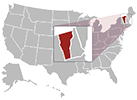
If you don’t know what career path to choose just yet, or consider changing the industry you work in, you could consider becoming an optician in Vermont.
Read this guide if you became curious and want to learn more about this occupation!
Page Navigation
Optician Job Description and Duties in Vermont
An important part of the decision-making is knowing what you’re expected to do as an optician in Vermont.
First off, here’s a list of the duties you’ll have:
- Preparing eyewear
- Fitting and adjusting eyewear
- Educating customers about eyewear issues and maintenance
- Keeping sales records
- Determining insurance co-pays
- Keeping the inventory
- Interacting with the labs that make lenses
Depending on your job title and the place employing you, you may receive additional tasks and duties.
All these responsibilities are actually meant to aid the customers to choose the right eyewear considering their needs and likes, and not only.
You won’t be inspecting their eyes nor prescribe their eyewear.
Optician Job Requirements in Vermont
According to the Vermont Office of Professional Regulation, to become an optician in Vermont, you need a license first.
For this, you need both formal training and to pass an exam, and we’ll present these later on.
This is a list of attributes of the ideal candidate for the optician position:
- A high school diploma or GED
- Graduating from a training program or having a formal education
- An associate’s degree diploma is highly appreciated by employers
- Good interpersonal skills
- Detail-oriented
- Reliability
- Clean criminal record
Optician Education in Vermont
Despite needing a license to become an optician, Vermont doesn’t have any schools offering formal training for this profession.
If you want to join such a program, you need to find a school that offers a program with a duration of at least 2 years.
Most of these schools will however be out of state.
Some people may not be able to attend classes in person, so an online program could be useful and accepted.
Keep in mind that schools usually only accept students with:
- A high school diploma or GED
- Completing specific classes with a minimum grade of C
- 2 letters of recommendation
- OAT scores – not older than 5 years
- Minimum GPA of 2.75
Future opticians need to learn among others, about:
- Introduction to Optometry
- Ocular Anatomy
- Systems 1: Neuroscience
- Ocular Microbiology
- Ophthalmic Imaging
- Public Health Optometry
- Glaucoma
- Physics
An alternative to formal education is joining an apprenticeship.
Apprentices must register with the Vermont Office of Professional Regulation and they spend 3 years in training.
Optician Certification in Vermont
The Vermont Office of Professional Regulation will issue a license to those who completed these steps:
- Have a high school diploma or a GED
- Graduate from a training program, either formal or an apprenticeship
- Pass the National Optician Competency Examination (NOCE)
NOCE is offered by ABO and has these levels:
- Beginner
- Intermediate
- Advanced
You must know how to:
- Read prescriptions,
- Fit and dispensing spectacles
- Use standard ophthalmic equipment
This exam costs around $200 and is meant for those who work with spectacles.
Your license will be valid for 2 years.
During this period, you’ll have to complete 10 hours of continuing education as well.
If you want to work with contact lenses, you’ll need to pass the Contact Lens Registry Examination (CLRE).
You’ll also have to pay $200 for this test that has the same levels of difficulty as the NOCE.
This test covers these topics:
- Pre-fitting for lenses,
- Diagnostic fitting,
- Dispensing of lenses,
- Patient education,
- Delivery
- Follow-up
Keep in mind that the NOCE and the CLRE diplomas must be renewed every 3 years.
Optician Employment and Salary in Vermont
What you should also know about opticians is that they’ll always be in demand, as people who need to improve their vision will always be around.
These are the locations that hire opticians the most:
- Stores
- Offices
- Optometry practices
- Hospitals
- Clinics
The average salary in Vermont is $46,000 per year, though many things influence this, including location, experience, or even job title.
Annual Salary Range:Average Salary of Opticians in Vermont
| City Name | Salary |
|---|---|
| Burlington | $47,294 |
| Essex | $47,294 |
| South Burlington | $47,294 |
| Colchester | $47,294 |
| Rutland | $47,720 |
| Bennington | $48,541 |
| Brattleboro | $48,688 |
| Milton | $47,266 |
| Essex Junction | $47,294 |
| Hartford | $49,231 |
Regional Salary in Vermont
| Region | Employed | Avg. Annual Salary | Avg. Hourly Pay | Top 10% Annual Salary | Bottom 10% Annual Salary |
|---|---|---|---|---|---|
| Burlington-South Burlington, VT | 50 | $57,770 | $27.78 | $71,340 | $39,190 |
* Employment conditions in your area may vary.
Additional Information for Opticians in Vermont
If you feel you need more help, look no further than the list with resources below:
- American Board of Opticianry Examination (ABO) and National Contact Lens Examination (NCLE)
- Commission on Opticianry Accreditation (COA)
- Vermont Office of Professional Regulation
- Vermont Optometric Association




